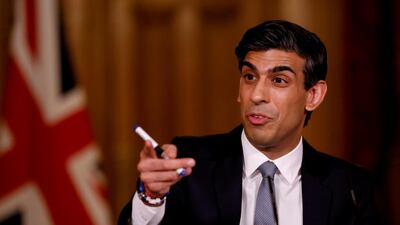Britain’s Chancellor of the Exchequer Rishi Sunak is pushing for a fairer way to tax the digital economy following US President Joe Biden’s call for a global minimum business tax rate of 21 per cent.
Mr Sunak is concerned the rate may be too high in the long term, despite the UK's pledge to increase corporation tax to 25 per cent in 2023 to help Britain's coronavirus-ravaged economy recover.
While the government supports a multilateral approach to achieve a coherent international tax system that fairly taxes large multinational digital companies, it has also led international efforts to ensure large digital businesses pay more tax in the countries in which they operate.
"The UK has been proactive in pressing for an international solution to the tax challenges posed by digitalisation of the economy for a number of years. And the Chancellor has made it a key priority of the UK's G7 presidency," a Treasury representative told The National.
“We welcome the US administration's renewed commitment to reaching a solution to these challenges through the OECD (Organisation for Economic Co-operation and Development). It’s also crucial that any agreement includes changes to ensure digital businesses pay tax in the UK that reflects their economic activities.”
Under Mr Biden’s plan, the world’s 100 most profitable multinationals would pay taxes to national governments based on the sales they generate in each country, no matter where they are based.
The blueprint would see the establishment of a global minimum tax rate to help bring an end to profit-shifting, where companies base themselves in countries with lower tax rates.
Tax campaigners said the Biden administration plan would raise £13.5 billion ($19.04bn) a year for the UK by US tech companies operating in the country, such as Facebook, Amazon, Apple and Google owner Alphabet, paying higher tax bills and helping to “level the playing field” for British businesses.
“Nothing angers the British public more than multinationals like Amazon, Google and others paying ultra-low levels of tax,” Tax Justice UK said.
“The Biden plan is a once-in-a-generation opportunity to put that right. The US president has proposed a new global minimum tax rate for companies to tackle this behaviour. After a year in which many big tech firms have done well, we need to build back better and move beyond our outdated global tax system.”
Britain’s Treasury said that finding an international solution to taxing the digital economy is a key priority as the UK looks to put in place a competitive tax regime that not only supports growth but also reinforces the UK's attractiveness as a place to do business.
At a Wall Street Journal summit last week, Mr Sunak said Britain's approach to a digital tax was about "finding a way of appropriately and fairly taxing large international digital companies".
While talks led by the Organisation for Economic Co-operation and Development are under way, with finance ministers from Germany, France and the Netherlands welcoming the move as a way to prevent tax avoidance by big companies and digital firms, tax campaigners say Britain has been quiet on the matter.
Paul Monaghan, chief executive of the Fair Tax Foundation, said Britain was the “laggard” of the Group of Seven allies, and that Mr Sunak’s proposed higher headline rate of UK corporation tax was “an irrelevant distraction”.
“We’re talking about a minimum,” he said. “It would mean it wasn’t worth anyone’s time shifting profits to Ireland or the Cayman Islands.”
Chairwoman of the Labour Party and former shadow chancellor Anneliese Dodds also welcomed the potential global shift in tax strategy and said Britain should play a leading role.
“Now that President Biden has moved the debate on, it’s important that our government plays its part," she said.
In April, the OECD said it was crucial that countries act together on challenges that span borders such as the Covid-19 crisis, as well as climate change, international trade and the taxation of multinational enterprises.
The organisation said prior to the pandemic, base erosion and profit-sharing practices cost countries $100bn-$240bn in lost revenue annually – equivalent to 4 to 10 per cent of global corporate tax revenue.
"Globalisation and digitalisation have highlighted weaknesses in the international corporate income taxation rules. This has led to growing dissatisfaction with the current rules and has seen a growing number of jurisdictions taking unilateral actions or departing from agreed international standards,” the OECD said, in its Going for Growth 2021 report.
“There has also been an increase in tax disputes and tax uncertainty. Such developments threaten the stability of the international tax system and represent a risk to global investment and growth.”
The organisation, along with the G20, is now co-ordinating talks between 135 nations on tax reform with the aim to “restore fiscal sustainability after the crisis”.
Ireland, which is resistant to Mr Biden's tax plan, has come under fire from the European Commission in recent weeks over its corporate tax rate of 12.5 per cent, one of the world's lowest.
The country seeks to secure a slice of the EU's recovery fund to help its economy bounce back from the Covid-19 pandemic. But the Commission wants Ireland to increase taxes in exchange for its share of the €750bn ($910bn) Recovery and Resilience Plan.


